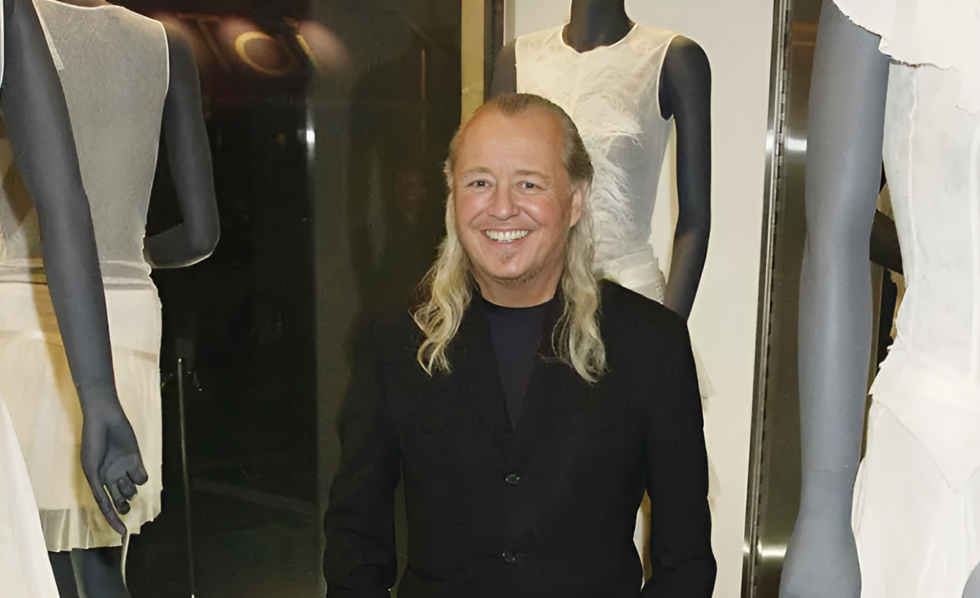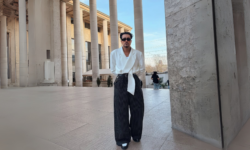
Introduction
In the ever-evolving landscape of fashion, some names leave a lasting impression not just for their designs, but for the ideologies they carry. Fayçal Amor, the Tunisian-born designer and founder of the renowned French fashion house Plein Sud, is one such name. Known for his daring fusion of sensuality and structured tailoring, Amor’s work in the 1990s captured the essence of powerful femininity, European craftsmanship, and Mediterranean flair.
Today, through his curated Instagram archive @faycal_amor_, the designer reintroduces his rich portfolio to a new generation hungry for authenticity, vintage charm, and fashion with meaning. With a career that spans over three decades, Amor’s story is one of cultural fusion, innovation, and timeless design.
Early Life and Roots in Fashion
Fayçal Amor was born in Tunisia and later moved to France, where he found himself immersed in a burgeoning fashion scene. With an academic background in economics and self-taught design skills, Amor defied conventional paths. He launched Plein Sud in 1984 from the South of France, where the label’s name—literally meaning “full south”—was a nod to both his geographic roots and the warm, sun-kissed aesthetic that would come to define the brand.
What made Amor stand out from the start was his refusal to follow the strict rules of haute couture. Instead, he offered clothing that blended elegance with edge, soft drapery with assertive structure. His design philosophy was based on empowering women—not by hiding their forms, but by highlighting their strength through silhouette, fabric, and attitude.
The Rise of Plein Sud in the 1990s
By the early 1990s, Plein Sud had gained significant traction in the fashion industry, especially among editors and buyers looking for something bold yet refined. Amor’s collections were defined by a mastery of leather, suede, and luxurious fabrics, often presented in body-hugging silhouettes with a Mediterranean sensuality.
His Fall/Winter 1995 collection, “Paris-Pigalle”, showcased his ability to fuse gritty urban themes with Parisian chic. With pieces that flirted between nightlife glamour and streetwise sophistication, the collection drew editorial attention from major fashion magazines including Madame Figaro, shot by renowned photographers like Serge Barbeau. The dramatic lighting, vintage styling, and empowered poses reflected a brand that knew how to make a woman feel bold and beautiful.
Amor also made waves with his Spring-Summer 1995 Couture Collection titled “Miami Vice”, which combined tropical elements with structured minimalism. The collection was featured in Air France Madame, with sun-soaked visuals that transported the viewer to a luxurious, heat-drenched runway of exotic elegance.
Design Philosophy and Cultural Fusion
Amor’s approach to fashion has always been more than surface-level. His garments draw from a mix of his North African heritage, French sophistication, and contemporary urban grit. His use of earthy tones, natural materials, and architectural cuts speaks to a deep understanding of the body and the spaces it inhabits.
He has often spoken about designing for real women—those who navigate the complexities of modern life with grace and defiance. There’s a silent power in Plein Sud’s pieces: dresses that cling and flow, jackets that cinch at just the right place, and textures that invite both admiration and touch.
As a designer, he also emphasized craftsmanship and quality over mass appeal. His pieces were often produced in limited quantities, making them collectible, wearable art that aged with elegance.
Digital Revival: An Archive Comes Alive
In recent years, Fayçal Amor has embraced digital storytelling, using Instagram as a living archive. His handle @faycal_amor_ is not your average fashion feed—it’s a curated trip down memory lane, featuring scanned editorials, behind-the-scenes photography, and glimpses into a fashion era that many now long for.
Each post is more than an image; it’s a narrative—a moment in time captured through fabric and form. For example, a recent post showcasing the “Paris-Pigalle” series includes rare scans from 1995 editorials, providing commentary on the inspiration behind the collection, the model’s pose, and the stylistic choices.
This revival is more than nostalgic; it’s educational. Younger fashion enthusiasts now have the opportunity to engage with a body of work that might otherwise be lost in the noise of fast fashion and fleeting trends.
Legacy and Influence
Fayçal Amor’s influence extends beyond the clothes themselves. He represents a bridge between cultures, eras, and ideals. His story resonates with creatives navigating their identity across continents, and with designers looking to balance commerce with creativity.
Plein Sud may not have reached the mega-brand status of some Parisian houses, but it carved out a loyal niche that still remembers its power. Today, vintage Plein Sud pieces are highly sought after in fashion resale markets, prized for their quality and distinct aesthetic.
Moreover, Amor’s quiet reentry into the conversation through Instagram has sparked a renewed interest in 90s fashion, editorial storytelling, and the value of slow design. He’s become a case study in how legacy can be reinterpreted and reintroduced with grace and purpose.
Conclusion
Fayçal Amor’s journey is a testament to vision, resilience, and artistry. From the sun-soaked streets of Tunisia to the fashion avenues of Paris, and now into the digital world, his work remains timeless. Through Plein Sud and his continued digital archive, Amor invites us to revisit an era of fashion that celebrated strength, sensuality, and soul.
In a world obsessed with speed, Amor’s work reminds us that some things are meant to be savored—slowly, intentionally, and with style.





